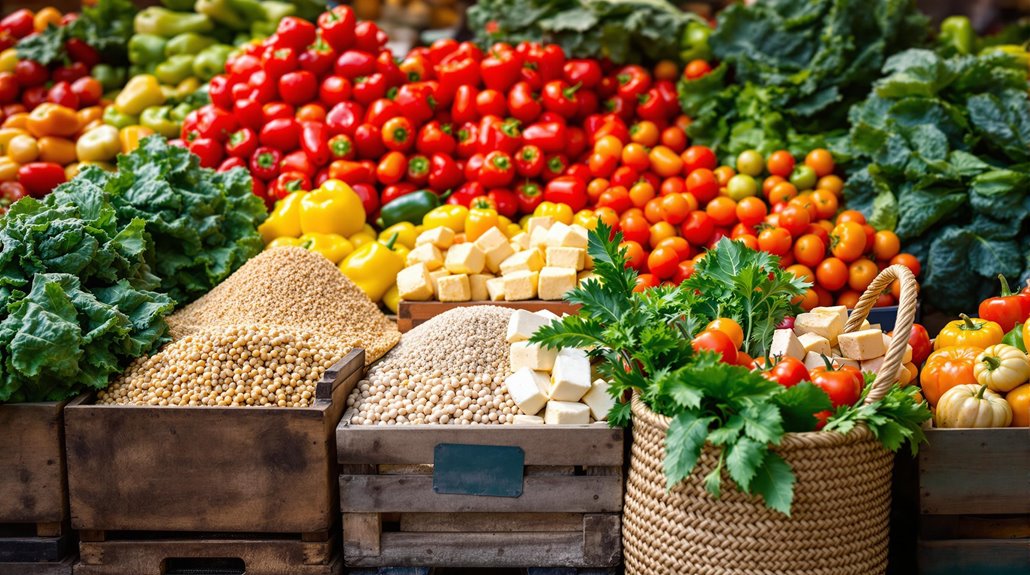Living abroad as a vegetarian doesn't mean you'll be stuck eating plain rice for months. You'll thrive by researching your destination's veggie scene, mastering key phrases like "senza carne," and connecting with local plant-based communities. Pack essential supplements, scout out farmers' markets, and keep protein-rich snacks handy for emergencies. From Thailand's veggie paradise to Ghent's meat-free movement, you're about to discover how global vegetarian life can be.
- Key Points
- Research Your Host Country's Vegetarian Scene
- Learn Key Food-Related Phrases and Terms
- Connect With Local Vegetarian Communities
- Pack Essential Supplements and Snacks
- Master Local Grocery Shopping and Food Markets
- Navigate Restaurant Menus Like a Pro
- Cook Smart in Your Student Housing
- The Last Word
Key Points
- Research your host country's vegetarian scene in advance to identify vegetarian-friendly restaurants, markets, and local dishes.
- Learn essential food-related phrases in the local language to effectively communicate dietary preferences when dining out.
- Connect with local vegetarian communities and study abroad programs to get insider tips and social support.
- Pack necessary supplements and protein-rich snacks to maintain nutrition when vegetarian options are limited.
- Master local grocery shopping by finding specialty stores and farmers' markets that offer plant-based alternatives.
Research Your Host Country's Vegetarian Scene
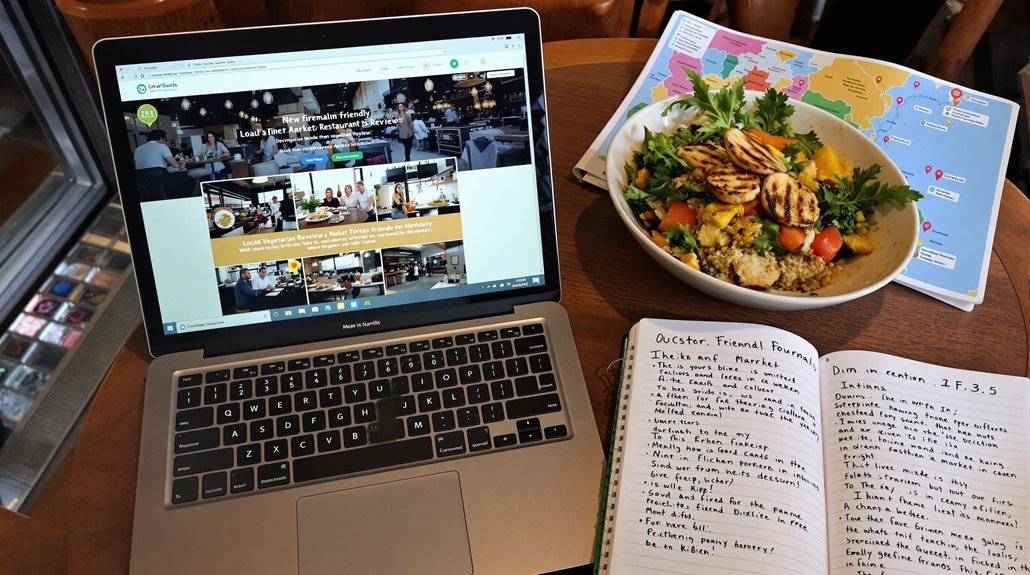
Before packing your bags for study abroad, wouldn't you rather know if you'll be living in a vegetarian paradise or a meat-lover's stronghold?
You'll be thrilled to discover that some destinations are surprisingly veg-friendly. Thailand's restaurants serve up 90% vegetarian dishes, while Singapore boasts 500+ veggie markets and a pioneering vegan fast-food chain. Among tropical destinations, the Seychelles ranks highest for vegetarian-friendly dining options.
Got your sights set on Europe? Belgium's Ghent kicked off a revolutionary meat-free movement, while Switzerland's thriving vegetarian scene supports 13% of its population. Learning to communicate dietary preferences in the local language can make restaurant ordering much easier.
If you're heading to India, you're in luck – it's a vegetarian haven where 30% of locals skip meat altogether.
Even traditionally meat-centric cities like Santiago, Chile are evolving, with hip plant-based eateries popping up across town.
Just fire up Google Maps to uncover thousands of veggie spots in your chosen destination.
Learn Key Food-Related Phrases and Terms
Ever tried explaining "no meat" using only hand gestures? Trust me, it's not a game you want to play when you're hungry in a foreign country.
Learning key food-related phrases is your ticket to hassle-free dining abroad.
Master essential expressions like "Avete" (Do you have) and "Posso avere" (Can I have) to inquire about meat-free options.
Simple phrases like "Avete" and "Posso avere" open doors to meat-free dining, turning confusion into culinary confidence abroad.
When you need to get specific, "senza" (without) becomes your best friend – "senza carne, per favore" will save you from awkward meat encounters.
Keep plant-based terms like tofu, seitan, and legumi in your vocabulary arsenal.
For extra assurance, learn to ask about hidden ingredients and vegan alternatives.
You'll discover that a few well-practiced phrases can transform your dining experience from stressful to smooth sailing.
From London's food markets to high-end restaurants, you'll find diverse vegetarian options in major cities.
Remember that Italians appreciate attempts to communicate in their native language, even if your pronunciation isn't perfect.
Connect With Local Vegetarian Communities
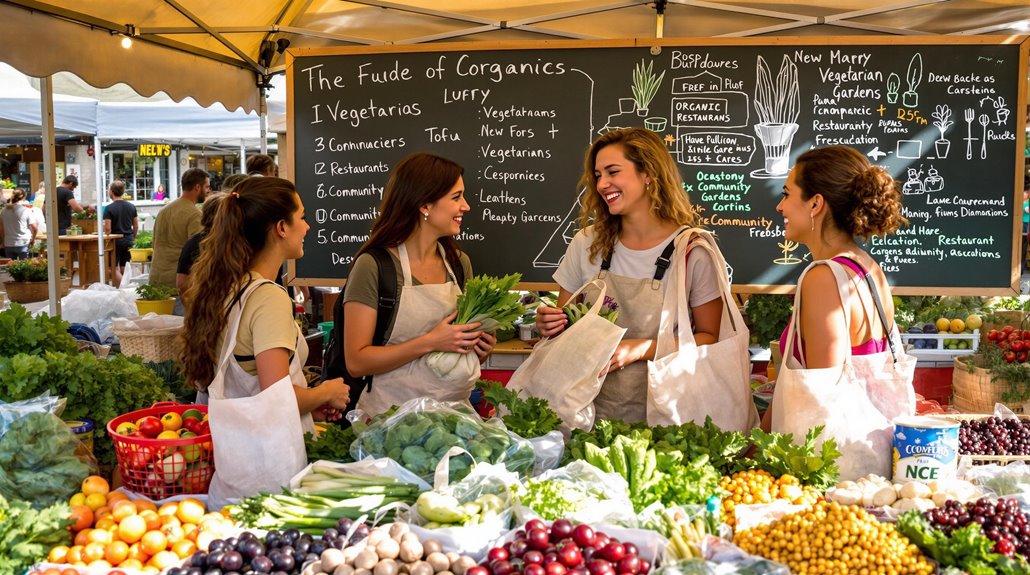
Who says being a vegetarian abroad means going solo? Your study abroad program is already looking out for you by evaluating dietary needs during host family placements.
Now it's time to expand your veggie circle beyond your home base!
Finding your plant-based tribe abroad opens up a world of local insights and friendship. Connect with like-minded individuals who can:
- Share insider tips on hidden vegetarian restaurants and markets
- Invite you to veggie-friendly social events and meetups
- Help translate local ingredients and menu items
Take advantage of social media groups, local vegetarian organizations, and university clubs to build your network. Programs like Dinner with a Dane create meaningful connections with local families who understand your dietary preferences.
Your program coordinator might even know other vegetarian students or host families in the area.
Pack Essential Supplements and Snacks
While connecting with local veggie communities is fantastic, smart packing can make or break your plant-based adventure abroad. Just like monthly budget planning, having a solid strategy for your nutritional supplies is essential.
Don't leave your nutritional needs to chance – pack those essential supplements like B12, iron, and vitamin D to keep your energy soaring. Pro tip: grab a thorough vegetarian multivitamin to cover your bases. Non-perishable items are ideal to pack since they won't spoil during your travels.
Your snack game needs to be equally strategic. Stash protein-packed lifesavers like peanut butter, nuts, and energy balls in your luggage.
Think of these as your emergency fuel when local options run thin. Mix and match portable powerhouses like almonds with dried fruits for ideal nutrient absorption.
And here's a savvy move: research local pharmacies and shops beforehand to identify which supplements and snacks you'll need to pack versus what you can buy there.
Master Local Grocery Shopping and Food Markets
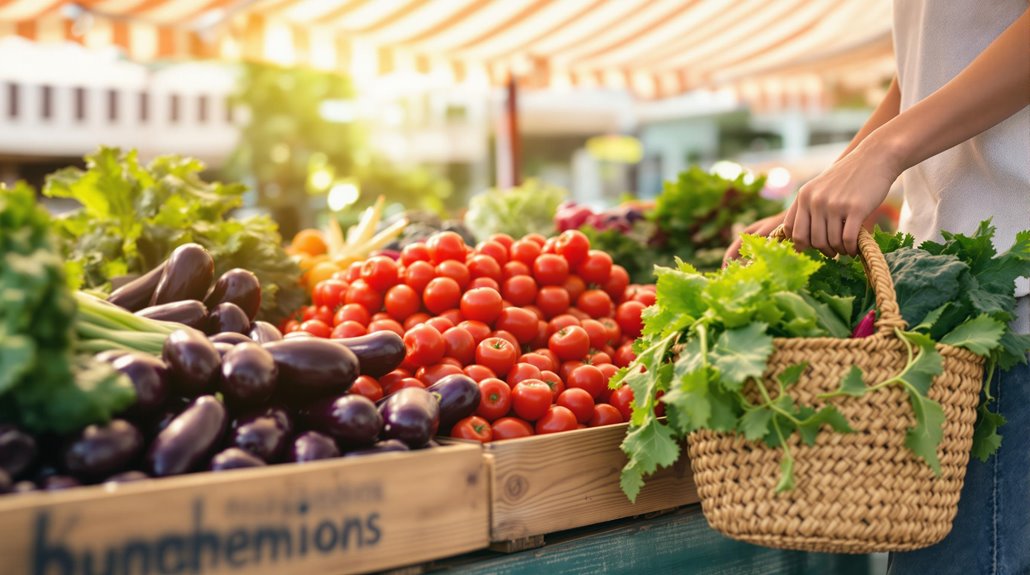
Once you've landed in your study abroad destination, mastering the local food scene becomes your next exciting challenge. Forget everything you know about grocery shopping back home – you're about to become a savvy international food navigator!
European stores are typically smaller than American supermarkets, so you'll need to adapt your shopping strategy. Setting a clear daily meal budget will help you make smarter shopping decisions and stretch your money further.
- Learn key vegetarian phrases like "sin carne" and be specific about excluding chicken and fish
- Scout out specialty shops for plant-based alternatives and ethnic grocery stores with veggie-friendly options
- Hit local farmers' markets for seasonal produce and unique vegetable varieties
Embrace smaller, more frequent shopping trips since produce tends to spoil faster overseas. The HappyCow app can help you locate vegan-friendly markets and shops in unfamiliar neighborhoods.
Bring reusable bags, ask about student discounts, and don't be shy about chatting with vendors – they're often goldmines of information about local vegetarian ingredients and cooking methods.
Navigate Restaurant Menus Like a Pro
Now that you've mastered the local markets, it's time to conquer the restaurant scene – where the real vegetarian adventure begins! Your secret weapons? Apps like Happy Cow and a arsenal of perfectly practiced phrases.
Start by scoping out veggie-friendly spots in cosmopolitan areas – Copenhagen and Santiago are your new best friends. Consider subscribing for updates from fellow travelers who share their vegetarian dining experiences.
Master the art of menu customization by learning to bypass common allergens and replace meat with plant-based alternatives. Don't just say "no meat" – get specific with "no pollo, pescado, o carne."
Track your wins and losses using your phone's notes app. Document which restaurants welcome modifications and which give you the side-eye when requesting a cheese-free quinoa bowl.
Cook Smart in Your Student Housing
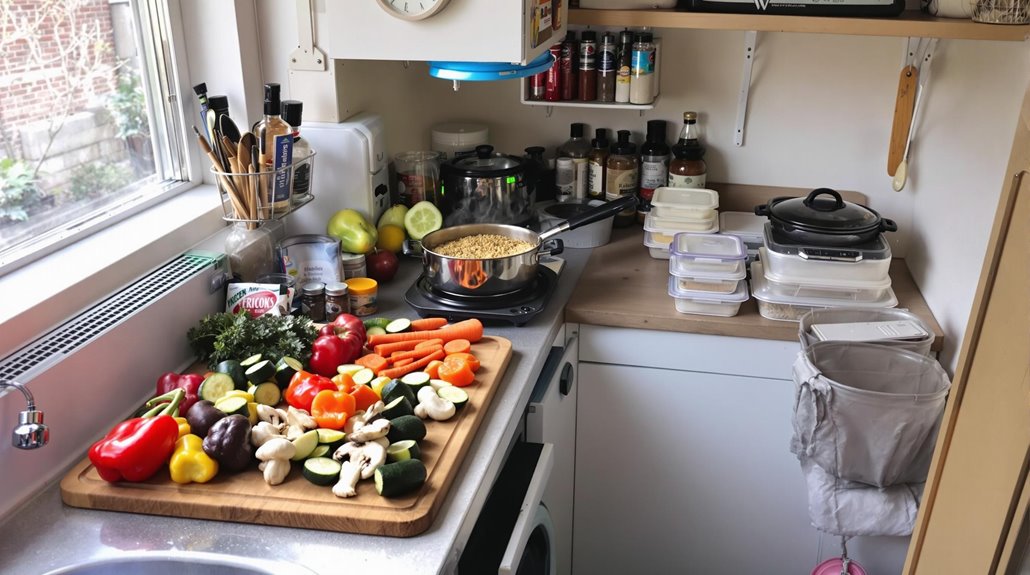
Living in student housing doesn't mean you're doomed to a diet of raw carrots and granola bars! Your dorm room can transform into a mini vegetarian kitchen with just a few smart moves.
Transform your dorm life beyond basic snacks – create a vibrant vegetarian kitchen space with simple, smart solutions.
Making delicious chipotle gazpacho soup only requires a blender and fresh ingredients, perfect for hot days in your dorm.
Start by stocking these game-changing essentials:
- A trusty microwave and mini-fridge combo for quick meal prep
- An electric kettle or rice cooker for versatile cooking options
- Reusable containers for storing your plant-based creations
Turn your space into a global veggie haven by mastering no-cook recipes like Mediterranean hummus wraps or Asian-inspired tofu bowls.
You'll save money and stay healthy by combining dining hall fresh produce with pantry staples like canned beans and nutritional yeast.
Growing windowsill herbs adds that chef's touch to your meals.
Pro tip: Keep protein-rich snacks like edamame or nuts handy for those late-night study sessions.
Students can save significantly on groceries by joining bulk buying groups with other vegetarians in their residence.
The Last Word
Your vegetarian adventure abroad doesn't have to be a menu of wilted salads and hangry moments. Armed with local veggie know-how, language skills, and cooking tricks, you'll transform into a savvy plant-based explorer. Picture yourself confidently strolling through lively markets, whipping up exotic meat-free feasts, and discovering hidden vegetarian gems in every corner. You're not just surviving – you're thriving on this global green journey.

